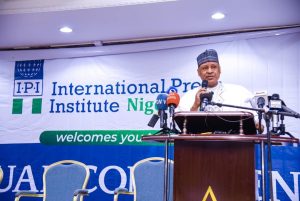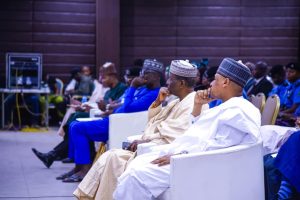
OPENING REMARKS BY THE HONOURABLE MINISTER OF INFORMATION AND NATIONAL ORIENTATION, MOHAMMED IDRIS, FNIPR, AS THE CHAIRMAN AT THE 2024 ANNUAL GENERAL CONGRESS OF THE INTERNATIONAL PRESS INSTITUTE NIGERIA, WITH THE THEME “DEMOCRACY, MEDIA FREEDOM AND THE IMPERATIVE OF PROTECTING NIGERIA’S CIVIC SPACE” HELD AT THE ABUJA CONTINENTAL HOTEL, ON THURSDAY, DECEMBER 12, 2024.
Protocol.
It is my honour and privilege to chair the 2024 IPI Nigeria Conference. Let me start by welcoming all of our guests and delegates today, from across the country, to this Annual General Conference and election of new executives.
The International Press Institute has built a formidable reputation over the last 74 years as a global platform advancing the rights, protection, and training of journalists. The Nigerian chapter has lived up to these ideals, and the caliber of Nigerian media executives and professionals who are associated with the IPI is a testament to the prestige it has garnered and maintained over the decades, and to the valuable place it occupies on the press landscape.
Standing here before you as chairman of this occasion, I am wearing two hats. First as Minister of Information and National Orientation in the cabinet of President Bola Ahmed Tinubu, overseeing Nigeria’s biggest public information platforms, and serving as a spokesperson and advocate of government policies and programmes.
In that capacity, wearing that important hat of ‘champion of government policies’, it is my pleasure and privilege to disclose to this distinguished audience, that our country is on the threshold of fundamental economic reform, verily unprecedented, largely known as the Renewed Hope Agenda – a deliberate and comprehensive recalibration of a long-neglected system geared towards economic diversification, human capital development, infrastructure, innovation, competitiveness, and inclusive growth.
One of the most topical examples right now is the tax reform initiative, which will go a long way towards simplifying Nigeria’s existing tax regimes and making compliance easier, while also reducing the tax burden on the most vulnerable Nigerians. A recurring highlight of the reform is the introduction of several new tax exemptions, that will benefit various categories of individuals and businesses.
Importantly, these tax reforms also complement ongoing macroeconomic reforms that are helping convert trillions of Naira that were previously lost to wasteful and abused subsidy programs, into substantial savings that are now able to finance productive sectors like high-impact physical and digital infrastructure, student loans and stipends, low-cost consumer credit, agricultural production, targeted social investment, and many more – all of the foundational elements required for a prosperous country that the world cannot ignore.
President Tinubu’s vision is that no one will be left behind in the new Nigeria that is emerging under his watch: young, old, male, female, student, farmer, artisan, trader, transporter, salesperson, digital/technology worker, retiree: there is something targeted at unlocking enduring prosperity for everyone. This is what the Renewed Hope Agenda is all about.
I hereby seek your support in amplifying the efforts of the Federal Government of Nigeria under the able leadership of President Tinubu for the actualization of the most far-reaching economic reforms since the return to democratic rule in 1999.
Distinguished guests, ladies and gentlemen,
My second hat is that of a media practitioner, which means that I am here amidst colleagues, to discuss familiar themes, and how we can play our parts in strengthening our profession while at the same time building our nation and its fledgling democracy.
A quarter of a century ago, Nigeria kickstarted a new democratic journey, the fourth attempt in our history. It was a tentative start, by a hopeful people, unsure what the fate of this fourth try would be. Would it go the short-lived way of the previous ones? The longest adventure, the first Republic, lasted only six years, and the shortest barely even took off.
Thankfully, what emerged in 1999 has proven to be resilient. It was and is not perfect, but it has withstood the twists and turns of time and chance. It has marched on, past the first decade, past the second, and now halfway through the third, and I think you can all agree with me that democracy is here to stay in Africa’s most populous country. This is something that we must never take for granted – especially seeing the threat that democracy has faced in our subregion and our continent, in recent years.
In this very important journey of democracy, the media has been a constant presence and companion. The Nigerian press is one of the most assertive and unyielding in the world, and it has always been so.

The Nigerian press has produced, over the decades, some of Nigeria’s most talented and remarkable professionals, great writers, golden-voiced broadcasters, innovative entrepreneurs, and Proprietors. But beyond the professional talent, the greatest asset of the Nigerian press has been the boldness, the fearlessness in the face of intimidation, the irrepressible capacity to speak truth to power regardless of the cost.
This audacity helped pave the way for our independence from colonial Britain, all those decades ago. The same fearlessness helped truncate military rule and usher in the 4th republic. And since the start of the 4th republic, none of those important attributes have diminished. You can see this in the way that the press continues to hold successive governments to account and to rally around their own in difficult circumstances.
This leads me to the concept of Media Freedom, one of the themes highlighted in the focus of this year’s IPI Nigeria Conference. It would not be controversial to assert that the Nigerian media space has been largely free since the return of democracy in 1999. Now I am not saying that there have not been challenges and threats here and there, but on the whole, Nigeria has enjoyed an openness and freedom that has seen the welcome proliferation of press organizations across print, broadcast, and digital media.
It has indeed been heartwarming to see the extent of entrepreneurial energy and innovation in Nigeria’s media space and to see organizations surmounting various odds to grow from strength to strength.
Since President Bola Ahmed Tinubu assumed office in May of 2023, and since I assumed office as Minister of Information and National Orientation in August of that year, we have asserted and reiterated our commitment to ensuring and expanding the freedom of the Nigerian press. Every time there has appeared to be a threat to this freedom, I have personally taken it upon myself to ensure that due process prevails and that the fundamental rights of the press are respected.
The President is a firm believer in media freedom and the protection of Nigeria’s civic space. Not only has he been a media entrepreneur himself, but he has also earned himself a place in history as one of the champions of the pro-democracy movement that saw the permanent end of military rule in Nigeria.
His emphasis on reforming and strengthening the judiciary is further proof of this commitment. Nigeria’s constitution guarantees the existence and protection of several fundamental citizens’ rights – rights that help define the normal and proper functioning of the civic space. The freedom of speech, of association, and so on.
Distinguished guests, ladies and gentlemen,
We must come to a very important realization, that the civic space is not only about freedoms, it is also about responsibilities. It is about each stakeholder according to all other stakeholders a measure of respect and accommodation. It is about accepting that there will be diverse and differing views and opinions on critical issues and that democracy can be a cacophony of voices.
It is about understanding that for every right there is a corresponding responsibility, and that freedom does not come unbridled. It is knowing that media freedom involves knowing and acknowledging the immense power that the press wields, as shapers and molders of public opinion and the permanent public record, and not abusing this power.
In closing these opening remarks of mine, let me stress that the civic space must be a civil space. There must be room for nuance, for healthy debate, for not always rushing to demonise those we disagree with.
At the same time, there is ample room for holding institutions to account, whether public or private. And yes, those elected and appointed to public office must always understand that they keep these offices in trust for the people, and owe it to these owners to be accountable at all times. These truths can and must all coexist, if we want to forge a stronger democracy, as the foundation for the strong and prosperous Nigeria of our dreams.
I look forward to listening to all our speakers today and to their insights on the important themes of democracy, press freedom, and the sanctity of Nigeria’s civic space.
I thank you for your kind attention.
Mohammed Idris, fnipr
Minister of Information and National Orientation
Federal Republic of Nigeria
11 December 2024
